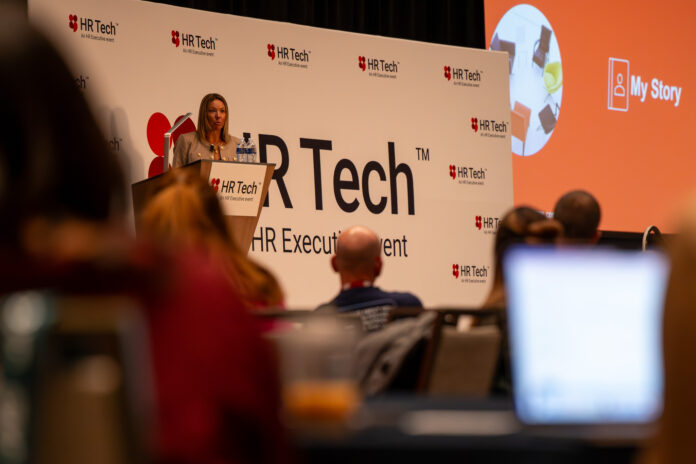What will it take to be a true ‘future-ready’ org?
- HRM Asia Newsroom
- Topics: Features, Home Page - Features, HR Technology

Sarah Hodges, Chief Marketing Officer, UKG, presents the opening keynote at Women in HR Tech. (Photo by Michelle Kuseske/HR Executive)
While exploring new tech solutions and strategising for integrating AI into work processes are top of mind for most attendees at this week’s HR Tech conference in Las Vegas, the consequences from speakers at the start of the event were clear: Building future-ready organisations is not just about creating an impressive tech stack.
The outsized impact of culture for future-ready organisations
At Monday’s Strategy Summit—a gathering of nearly 100 senior HR leaders on the eve of HR Tech—the role of culture in driving future-ready organisations was a frequent point of discussion.
Setting the culture right—along with developing workforce skills and focusing on AI-readiness—is pivotal to creating future-ready organisations, said Kevin Oakes, Founder and Chief Strategy Officer of the Institute for Corporate Productivity (i4cp).
“The only thing predictable about life is unpredictability,” Oakes said. “And a lot of CEOs and leaders are recognising that, in unpredictable times, the one thing that gives them an edge is their culture.”
Oakes highlighted i4cp research on the practices that can shape healthy cultures, including flexible work arrangements (FWAs), learning cultures and leadership modelling. Leaders should regularly communicate their values and address poor behaviour, Oakes said. And organisations must hold them accountable for employee outcomes, not just business outcomes, such as retention, mobility and development.
At the same time, HR must push their organisations to avoid patterns that create “toxic” cultures, Oakes said. For example, bureaucratic, disrespectful, hierarchical environments can inhibit the growth of healthy cultures.
Culture is becoming more integral to business growth than ever, as organisations navigate ongoing uncertainty and the need for transformation amid the influence of AI.
A healthy culture today, Oakes added, is one in which the workforce feels empowered to embrace change. HR should be alert for red flags of “change-averse” cultures: such as a “me versus we” mindset and talent that is content but complacent—a risk that Oakes said is particularly high today at organisations where layoffs loom.
Leadership transformation in the age of AI
Apart from economic-driven layoffs, employee fears about being “replaced” by AI continue to be pervasive, said Sarah Hodges, Chief Marketing Officer of UKG, at Tuesday’s Women in HR Tech opening keynote address. HR has an opportunity, she said, to provide clarity through transparent communication and by reframing the conversation about AI.
READ MORE: Agentic AI in HR: Unpacking the hype and addressing the uncertainty
“We as leaders need to make sure our peers, our teammates, are open-minded and changing the way we think about tech,” she said.
Building trust and resilience of the workforce as technology reshapes work will be critical to thrive in changing environments, Hodges said. How to get there?
Four pillars of future-ready organisations
Hodges offered several common practices that future-ready organisations embrace. Such organisations:
Have leadership that empowers: To prepare their organisations for the future, leaders need to step back and enable their teams. “It takes courage and can feel really scary—but also really rewarding,” Hodges said.
This work should involve incorporating diverse perspectives into leadership; such efforts, she said, can increase organisational success by nearly 40%, according to McKinsey research. “It can have a real, tangible impact,” Hodges said.
Transform leader mindsets: At future-ready organisations, trust flows from the top of the organisation down, and from the bottom up. “When people see the door open, they feel part of problem-solving,” Hodges said, noting that the level of empowerment requires leaders to transform their traditional thinking about leadership.
Turn intentions to impact: The potential for technology to reshape the future of work is vast—but organisations need to be ready to turn their ideas for how to capture that opportunity into real outcomes. Technology can be a “fantastic bridge” that can turn a vision for the future into a reality, Hodges said. For instance, organisations looking to design processes in tune with workforce needs can leverage AI-powered systems for deeper insights into employee behaviour; tech should not just be looked to for recordkeeping and process automation any longer, she added.
Use tech to create space for better work: Future-ready organisations recognise AI’s power to augment human capabilities—not replace. “It’s about how we use tech,” Hodges said, “to extend our collective impact.”
About the Author: Jen Colletta is Managing Editor at HR Executive, where this article was first published.






